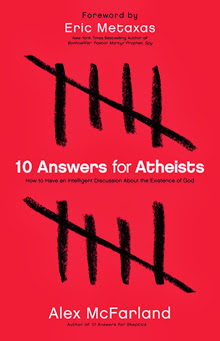Alex McFarland, an Evangelical Protestant professor of Christian Apologetics at North Greenville University (South Carolina), has authored 10 Answers for Atheists (Regal, 2012) as an outreach tool to spread the Good News to atheists and agnostics. McFarland is said to have pioneered apologetic conference formats for Christians to defend their faith. McFarland seems to draw upon this experience in composing a book on apologetics that is easy to read and draws upon contemporary influences to reach an unbelieving audience.
 |
| Alex McFarland |
These pop references do not always work. To illustrate a “Biblical Scholar Atheist”, McFarland posits Penn Jillette as he rejects scripture as “B.S.”. This Bible Scholar Atheist label on Jillette seems like a bad trick for one who does not ascribe to Judeo-Christian scripture. It would be a more apt description of Dr. Francesca Stavrakopoulou, the Hebrew Atheist scholar host of the BBC’s Buried Bible Secrets series.
McFarland categorized atheists into ten subgroups. There seemed to be overlap between some of the groups, like the Angry Atheist and the Injured Atheist. The University of Tennessee study which was Assessing Atheist Archtypes with six categories seemed more on the mark. However, McFarland may have included other categories to finesse the apologetic approach.
McFarland offered a clear yet concise historical survey of disbelief which provides an underlying basis for agnosticism and atheism from Antiquity and the Enlightenment to present day. While the author acknowledged a few popular contemporary atheists, but two page and a half refutations of Richard Dawkins, Christopher Hitchens and Sam Harris seemed woefully insufficient to all but those already convicted.
The author includes a chapter “Alternatives to a Biblical God” which seemingly served as a comparative theology section. McFarland dared to take on Islam, a monotheistic faith which does not embrace the Trinity, denies the the Divinity of Jesus and rejects substitutionary atonement. McFarland explained away Judaism as ceasing to be a sufficient theology after the earthly appearance of Jesus. McFarland opines that a natural progression of Judaism would be Christianity instead of recognizing the Lord’s faithfulness to His chosen people.
In the Christian realm, Unitarianism is undercut as being an incomplete creed. Jehovah’s Witnesses are chastised for rejecting the Trinity, denying the divinity of Jesus, contrary conceits of hell (annihiliationism), having no holidays and being a works based denomination. Mormonism is minimized as being “Many Gods and Me too”. The LDS are damned with faint praise as having a surface appeal of being wholesome and displaying devout behavior but having a creed which finds the New Testament corrupt, adds to scripture and is a works based faith.
It was surprising that “Roman” Catholics and the Orthodox were not condemned along with modern Mystical spiritualism, as those original Christian creeds used their mysticism to draw closer to union with God. The crux of the Protestant Reformation was religiosity based on biblical roots (often understood as sola scriptura) as well as the primacy of a salvation by grace. But McFarland does not divide with Catholics or Orthodox Christians on this score in the spiritual warfare against atheism.
McFarland gets to the crux of 10 Answers for Atheists 121 pages into a book with 165 pages of text. The recap of the ten types of atheists in five pages seemed to repeat cautions given earlier in evangelizing to them. Answering to agnostics is done through two sample dialogues.
McFarland poses the ten questions by atheists:
• Are faith and reason really compatable?
• Isn’t belief in God delusional?
• The dysteleological surd – If God is so good, why is there evil in the world?
• Why join a flawed faith like Christianity which has harmed the world?
• Isn’t Christianity just mythological?
• Why believe in Zombies (a messiah resurrected from the dead)?
• Can’t science explain everything?
• Why believe hypocritical Christians?
• Couldn’t Jesus just be a space alien?
His answers plant the seeds for useful apologetics as well as the thirty common objections included in the index.
As a Catholic, I am mindful that the practice of my faith differs with a more evangelical expression of faith by bible based Protestants. However, the 10 Answers for Atheists has some material which would provide some thoughtful responses when dialoguing with questioning agnostics and atheists. Some of the book seemed extraneous to inter-(non) faith dialogue, such as the comparative religion section. McFarland seemed compelled to justify bible based Christianity before delving into agnostic apologetics.
Aside from the Angry Atheist and the Resident Contrarian Atheist, McFarland’s 10 Answers for Atheists could serve as a useful field manual for believers beginning dialogue with non-believers. It does not seem geared at convincing atheists through a casual perusal. The casual Dawkins, Hitchens and Harris dismissals would be insufficient for true non-believers. Moreover, an agnostic or atheist reader would need to drudge through comparative religion and justifying bible based Christianity sections before getting to the crux of the answers for atheists.


No comments:
Post a Comment